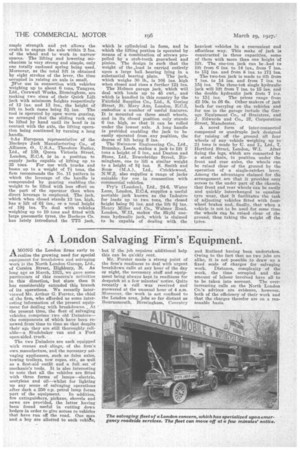A London Salvaging Firm's Equipment.
Page 110

If you've noticed an error in this article please click here to report it so we can fix it.
11.A MONG the London firms early to realize the growing need for special equipment for breakdown and salvaging work is the North London Garage, Ltd. of Corsica Street, Highbury, N. As long ago as March, 1021, we gave some particulars of this concern's activities in this direction, but since then it has considerably extended this branch of its operations. We recently interviewed Mr. Arthur G. Forster, the chief of the firm, who afforded us some interesting information of the present equipment for dealing with breakdowns.. At the present time, the fleet of salvaging vehicles comprises two old Daimlers— the components of which have been renewed from time to time so that despite their age they are still thoroughly, reliable—a Studebaker van and a Ford
open-sided truck.
The two Daimlers ere each equipped with cranes and slings, of the firm's own manufacture, and the necessary salvaging appliances, such as false axles, towing trolleys, tow ropes, etc., as well as a first-aid outfit and a full set of mechanic's tools. It is also interesting to note that all the vehicles are fitted with three forms of lamps—electric, acetylene and oil—whilst for lighting up any scene of salvaging operations after dark a 250 c.p. petrol lamp forms part of the equipment. In addition; fire extinguishers, pickaxe, shovels and saws are provided, the latter having been found useful in cutting down hedges in order to give access to vehicles that have run off the road. One man and a boy are allotted to each vehiae, but if the job requires additional help this can be quickly sent.
Mr. Forster made a strong point of the firm's readiness to deal with urgent breakdown calls at any hour of the day or night, the necessary staff and equipment being always kept in readiness for despatch at a few minutes' notice. Quite recently a call was received and answered at the unusual hour of 4 a.m. Moreover, the work is not confined to the London area, jobs so far distant as Bournemouth. Birmingham, Coven I ry and Rutland having been undertaken. Owing to the fact that no two jobs are alike, it is not possible to draw up a fixed scale of charges for salvaging work. Distance, complexity of the work, the time occupied and the amount of labour involved have all to to be taken into account. The everincreasing calls on the North London Co.'s stdvices are evidence, however, both of the efficiency of their work and that the charges therefor are on a reasonable basis.












































































































































































